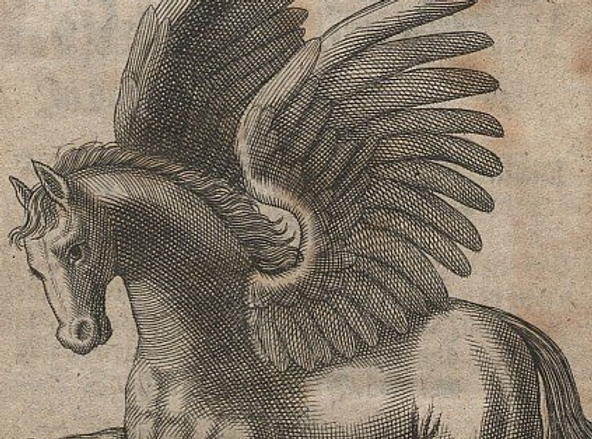Discover Arion: The Legendary Greek Mythology Winged Horse
His Lineage
Arion was the offspring of Poseidon and Gaia, or of Poseidon and Demeter (depending on the source), conceived while they were in the form of horses. Posiedon was also the father of other mythical horses, including Skyphios and Pegasus. Arion was born beside the spring Tilphôssa in Greece and had a sister known as Despoina. He was initially employed to pull the chariot of Poseidon.
An alternative explanation is that Arion is the offspring of Zephyrus and a harpy, suggesting a dark or infernal nature. This dual identity may explain why Arion is described in disparate ways.
Talking Horses
The description of Arion as a talking horse may be entirely deliberate, as Hera was said to give the power of speech to the steeds of great heroes. In the poem Thebaid by Statius, Arion is also said to provide prophecies of the future, warning his master of impending danger and carrying him to safety.
What did Arion look like?
Arion appears differently across sources. He is often described as being dark (specifically a midnight blue), but at other times as white or pale. His mane is variously described as dark or fiery red. In some accounts, Arion is said to have two hooves and two human feet (both on the right side of his body).
Arion - the Other Winged Horse
Did you know that in Greek myth, Pegasus was not the only winged horse?
In ancient Greek myth, Arion (a.k.a. (Areíôn, Eríôn) was an immortal horse with the power of speech (although some put this strange ability down to an error in translation, often attributed to Propertius).
He was also considered to be the fastest horse that ever existed. Arion is one of the four famous horses that are pillars of Greek myth, along with Pegasus, Xanthus, and Skyphius.


Arion is associated with:
Poseidon:
Arion was raised by sea nymphs and taught how to pull Poseidon's chariot. The horses pulling Poseidon's chariot are often depicted as hippocampuses with the hindquarters of fish, but no description of Arion is made in this way.
Kopreus/Copreus:
Apollo's son, king of Haliartus, was given Arion by Poseidon, who gave him to Hercules.
Hercules:
Hercules rode Arion into battle against Elis. Hercules also rode Arion to victory in a race against a son of Mars. He in turn gave Arion to Adrastus.
Adrastos:
Arion and Krakos drew the chariot of the king Adrastos in the Quest of the Seven against Thebes. Arion is said to have spoken to Adrastos to warn him against war with Thebes. The war failed, and only Adrastos survived due to Arion's swiftness. Arion was said to have a naturally wild and fiery nature, but Adrastos was a calm and mild man. His temperament affected that of the horse, making him more tractable.
Archemoros:
Arion is also said to have spoken to pronounce the death of Archemoros.
Temples
The people of the city of Abdera showed particular honor to horses and the city boasted a temple dedicated to Arion.
Sources
Iliad (Homer)
-
"... there is no man that shall catch thee by a burst of speed, neither pass thee by, nay, not though in pursuit he were driving goodly Arion, the swift horse of Adrastus, that was of heavenly stock ...”
Shield of Heracles (Hesiod)
-
"Guide the great horse, Arion of the black mane, through all his turns and make him help us, as best you are able.'"
-
"To Horses beyond all mortal creatures cunning Nature has given a subtle mind and heart . . . A horse there was which ran with light feet over the corn-ears and brake them not; another [offspring of Boreas] ran over the sea and wetted not his coronet."
Namesakes:
Arion provides the name for a music album, a design company and stable. Many horses have also been given the name of Arion.
References
-
Johnston, S. I. (1992). Xanthus, Hera and the Erinyes (Iliad 19.400-418). Transactions of the American Philological Association (1974-), 122, 85-98.
-
Levertov, D. (1987). Horses with Wings. What Is A Poet?, 124.
-
Miličević-Bradač, M. (2003). Greek mythological horses and the world's boundary. Opvscvla archaeologica, 27(1), 379-392.